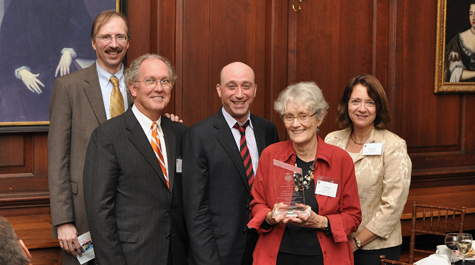Brigham-Kanner Property Rights Conference celebrates 15th anniversary
It seems fitting that a gathering centered around property rights, a cause dear to many of America’s founders, would find a home at William & Mary Law School, which dates its founding to 1779.
The Brigham-Kanner Property Rights Conference, hosted each fall since 2004 by the Law School’s Property Rights Project, will celebrate its 15th anniversary Oct. 4-5. The event will once again bring together leading scholars and attorneys for robust discussions of the importance of property rights to society and recent developments in the law that affect them.
Among the highlights of the conference is the annual presentation of the Brigham-Kanner Property Rights Prize to an outstanding scholar, practitioner or jurist whose work affirms the fundamental importance of property rights. Recipients have included Justice Sandra Day O’Connor, economist Hernando de Soto, attorney Michael M. Berger, and a host of scholars, including Professor Frank I. Michelman of Harvard University, who received the inaugural prize. Professor Stewart E. Sterk of the Benjamin N. Cardozo School of Law is the 2018 prize recipient. Noteworthy milestones in the conference’s history include the publication in 2011 of the first volume of the Brigham-Kanner Property Rights Conference Journal and conferences held in Beijing in 2011 and The Hague in 2016, which facilitated the participation of leading academics and practitioners from other countries.
Chancellor Professor of Law Lynda L. Butler, director of the Property Rights Project, credited Law School alumnus Joseph T. Waldo ’78 for “thinking boldly” and being the driving force for the conference’s creation and for its continued vigor through the years. He had “a vision for promoting the advancement of property rights through the involvement of attorneys and academics in a conference and in the publication of a journal,” she said.
“It is the only conference,” she added, “that regularly engages both academics and attorneys in an exchange of ideas about the importance of property rights to society.”
According to Butler, a special benefit is the chance it affords students to network with top practitioners and enjoy the friendly “sparring and banter among panelists and with the audience.”
For Waldo, property rights are deeply meaningful and the Brigham-Kanner Property Rights Conference and Brigham-Kanner Property Rights Prize recognize two leaders in law who have had an enormous impact on his life.
“My law practice changed course years ago when the government took my property,” he said. “That is when I began to fully appreciate the importance of property rights, when I was about to lose mine.”
He became acquainted through the American Law Institute with two men who became his role models: Toby Prince Brigham, a practitioner in Miami, and Gideon Kanner, a professor at Loyola Law School in Los Angeles.
“I learned from them how to protect myself and my property and then how to protect the private property and civil rights of my neighbors who came to me for help. That is how my eminent domain practice in Norfolk, Virginia, started. Toby and Gideon have had a tremendous influence on my practice and the practice of many others,” he said.
Earlier this year, the Law School created the Joseph T. Waldo ’78 Visiting Chair in Property Rights Law to honor Waldo’s leadership and service.
Robert H. Thomas is the inaugural holder of the Waldo Chair and is teaching a course this semester at the Law School on eminent domain and property rights. He practices law in Honolulu and is engaged with property law issues on a state and national level as a speaker, author and widely read blogger.
Thomas praised Waldo as “one of the leaders of the property rights bar,” who is known for his devotion to “the mentoring of lawyers new to our field.” He said the Brigham-Kanner Property Rights Conference is highly regarded among members of the bar.
“Practitioners can view ‘academic’ conferences as not particularly relevant to our day-to-day practices,” he said. “The Brigham-Kanner Conference, by contrast, with its focus on both the theory and practice of property law and property rights, is right on the cutting edge of our area of law. We’re developing and studying new theories and approaches that we can put into practice in the courts.”
In 2017, the Brigham-Kanner Property Rights Conference recognized William & Mary President Taylor Reveley for his “gifts of service” over two decades, first as dean of the Law School, and later as university president. In his remarks, Reveley recalled the early years of the conference during his deanship and Waldo’s essential role in the annual gathering’s creation and its success.
“Joe made it possible,” he told the audience, “And it has been hard to pull off, but it has flowered to a brilliant degree, far beyond, I think, Joe’s or my dreams.”
To learn more about the 2018 Brigham-Kanner Property Rights Conference on October 4-5, and to register, please visit the William & Mary Property Rights Project's website.























